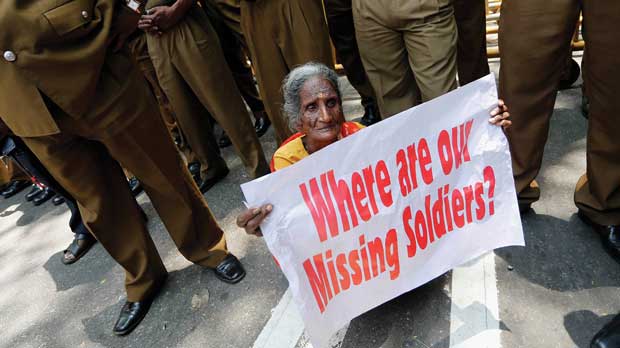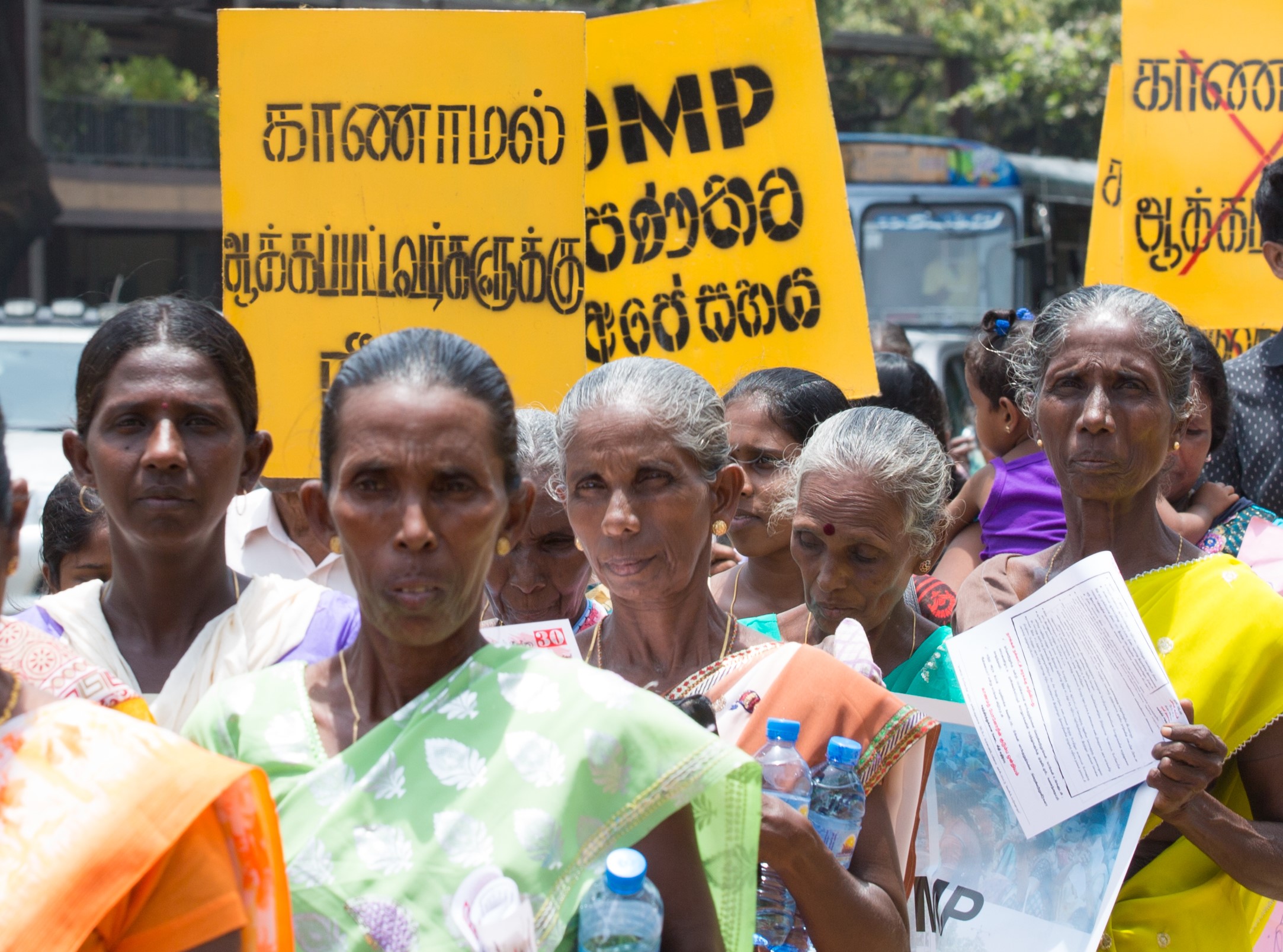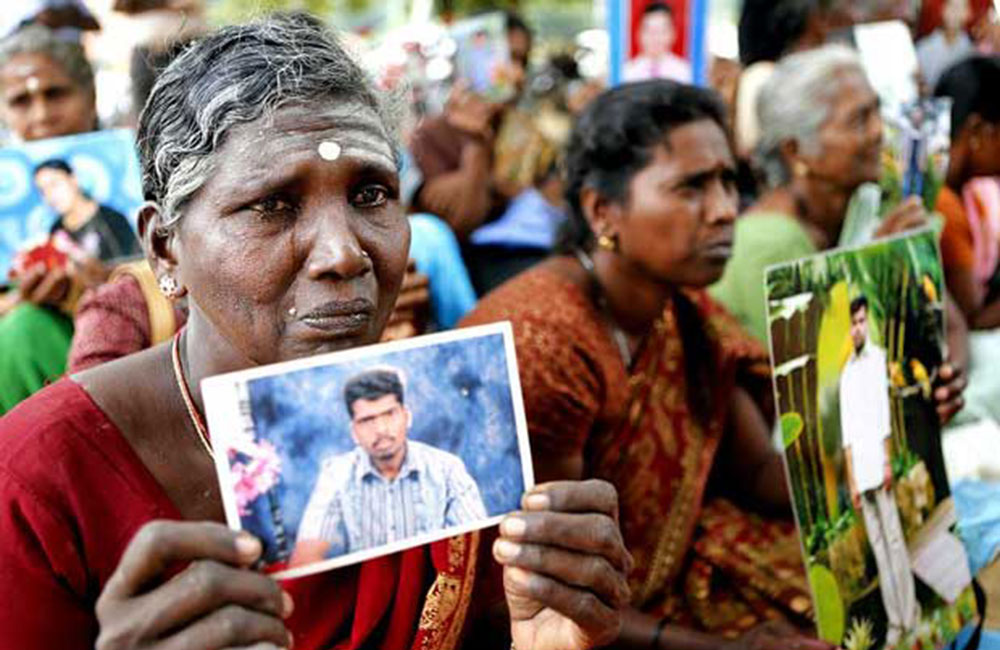OMP provides 'audacity of hope' to Sri Lanka
By D.B.S.Jeyaraj
Let me begin on a very personal note. The first major emotional upheaval I underwent as a result of losing a very loved one, was when I lost my maternal grandfather in December 1968. I was 14 years old at that time. I was inordinately fond of him and he of me, his eldest grandchild.
My grandfather had been ailing for some time and his impending demise was expected. Both his children, their spouses and all his grandchildren were around his bed when my grandfather breathed his last.
We were living in Kollupitiya at that time and my grandfather passed away peacefully at our residence. The doctor came and certified his death there.
The undertakers took the body away, embalmed it and brought it back in a coffin for people to pay their respects. The funeral service was at our home. The burial was at Kanatte. A memorial service was held two months later in a Methodist Church in Colombo. A memorial monument was duly erected at Kanatte.
Why I relate all these details is to emphasize that I was witness to each and every aspect of my grandfather’s final farewell to this world - from his deathbed to tombstone. I knew fully well that my grandfather had died and that he was not among the living yet I refused to accept that he was dead. Being quite young and having been so fond of him I could not cope with his loss. We were living at the bottom of the lane (Aloe Avenue) by the seaside then.
All such illusions were shattered when war came to Sri Lanka. War is nothing but nasty, brutal destruction. There is nothing laudable in it except perhaps the individual bravery of those courting death for what they thought was a just cause.
I was learning Tennyson’s “break, break, break” in my GCE (OL) English Literature class. The poem written by Tennyson over the loss of his friend Arthur Hallam resonated very much with me then. I would sit on the rocks along the Colpetty beach just as Tennyson did “at the foot of thy crags O’sea” and think of my “Appa” as I called my grandfather. (I called my father Papa & grandfather Appa).The lines “But O’ for the touch of a vanish’d hand, And the sound of a voice that is still!” would strike responsive melancholy chords in my heart.
Still, the loss was too much to bear then. I just could not accept the fact that my grandfather was dead and gone. I started imagining that he was really alive and that he never died. Whenever I saw an elderly male who bore a resemblance to my grandfather, I would go up to him and stare intently at the point of embarrassment. Sometimes while travelling alone by bus, I would see someone who looked like him on the pavement, get down at the next halt and run back only to be disappointed. Far worse was the thought that like Jesus Christ, my grandfather too had risen from the dead. I would go to Borella, look at his grave and then wander around Kanatte hoping to catch a glimpse of him.
Burden Of “Sorrowful Affection”
Finally, I was liberated from this burden of “sorrowful affection”. Due to certain reasons, my family relocated from Colombo to Jaffna in December 1969 just one year after my grandfather’s death. While my parents and siblings lived at Chavakachcheri, I was boarded at Jaffna College, Vaddukkoddai. The change of environment and the different experience of living in the North as opposed to that of living in Colombo brought about a change in me. I stopped imagining that my grandfather was alive and began adjusting to life after his death. With the passage of time the sorrow and grief lessened but never ever went away. And then, of course, there were other losses and deaths. (I lost my parents, sister and close relatives and friends over the years).
Then there was the escalation of the ethnic conflict and its consequences. I began losing track of the people whom I knew who died or disappeared or went missing or were injured or got displaced as a result of the ethnic conflict.
Why I recount my experience of almost half a century ago is to show how the loss of a loved one could have a traumatic effect on people. In my case, I had seen the death, funeral, burial and memorial service of my grandfather and even knew the grave in which he lay. There was full closure.
Yet I could not for many long months accept his death or come to terms with the fact that he was no more. This experience makes me ultra-sensitive to the agony and pain suffered by those who have undergone loss without proper closure particularly those who do not know what has happened to their loved ones.
Still, the loss was too much to bear then. I just could not accept the fact that my grandfather was dead and gone. I started imagining that he was really alive and that he never died.

When a loved one disappears or is made to disappear and you have no news at all about the missing person how does one cope with that loss? How can memory be consoled when there is no knowledge of what had happened to a loved one? How can a troubled heart be pacified by the mind if no one knows the fate of what befell a loved one?
For many decades I have been writing on politics of Sri Lanka. The island’s politics has for long been overshadowed and even overwhelmed by an armed conflict. War has its own consequences and its distinct fall-out. Very often the original causes of war are forgotten and even replaced by new problems and grievances. When I was young and read about the war in newspapers and saw battle scenes on screen, I had a romanticised outlook on war. I regarded war as a noble adventure and fighting as heroic.
All such illusions were shattered when war came to Sri Lanka. War is nothing but nasty, brutal destruction. There is nothing laudable in it except perhaps the individual bravery of those courting death for what they thought was a just cause.
The war in Sri Lanka was a dirty war. It was not fought by soldiers carrying the UN Human Rights Charter in one hand and love in their hearts as former President Mahinda Rajapaksa once stated. The Tigers and other militant fighters were no saints either.
An inevitable consequence of the war was the phenomenon known as Enforced Disappearances. A very large number of people in Sri Lanka disappeared or were made to disappear or went missing as a result of the conflict regarded at one time as South Asia’s longest war.
The well-known Human Rights Organization, “Human Rights Watch”(HRW) observed thus in a statement: “Tens of thousands of people were forcibly disappeared in Sri Lanka since the 1980s, including during the last months of the war between the government and the Liberation Tigers of Tamil Eelam (LTTE) in 2009...... The UN Working Group on Enforced or Involuntary Disappearances ranks Sri Lanka as the country with the second highest number of disappearances in the history of its tenure.”
“Most of those reported disappeared during the three-decade long conflict between government forces and the LTTE were ethnic Tamils. A short-lived but violent insurgency with a majority Sinhala militant group in the country’s South in the late 1980s also led to many enforced disappearances and other abuses by both sides. Various Commissions of Inquiry established by successive Sri Lankan Governments in response to pressure from victims’ groups and others have produced reports that have largely remained unpublished and have not resulted in criminal prosecutions of those responsible.”
For people whose loved ones pass away tragically in an accident or are killed through violence the struggle to cope is more painful. The worst, however, is for those whose loved ones are made to disappear or have gone missing.
Enforced Disappearances Phenomenon

The HRW statement focuses on enforced disappearances during the war and its aftermath and also highlights the fact that most victims were Tamils. But disappearances did not occur only during the ethnic conflict and neither was the enforced disappearances phenomenon a Tamil monopoly.
People of all ethnicities were victimised but the bulk of war victims were certainly Tamils. A large number of Sinhala youths were made to disappear when the State ruthlessly suppressed the bloody insurgencies led by the Janatha Vimukthi Peramuna (JVP) in 1971 and 1988/89.
As a journalist writing about politics and war in Sri Lanka, I had to write about missing persons too. There were some disappearances like those of Fr. Thiruchelvam Nihal Jim Brown the Allaippiddy Parish Priest and Eastern University Vice-Chancellor Prof.S. Raveendranath about which I wrote extensively.
There were other disappearances about which I did not write in very great detail. Time, media space and scanty information being the reasons. Very few Sri Lankan journalists wrote about disappearances and irked the powers that be then. There were many disappearances about which nothing was written. They have become part of official and unofficial statistics.
Yet every single case of a missing person has a heart-rending story behind it. A missing person may be treated by officialdom as a mere statistic but he or she has a family and many loved ones who yearn for some reliable information about what has happened to him or her.
The disappearance of loved ones is not something restricted to one community or one ethnicity alone. It is correct that the Tamil people have suffered more than other ethnicities proportionately. Yet, the Sinhala people to have suffered immensely during the JVP insurgency of 1988-89. The State ruthlessly suppressed the JVP revolt then. Thousands were killed and thousands simply disappeared.
Many years ago before Chandrika Kumaratunga came to power, Dr Manoranee Saravanamuttu, the mother of Richard de Zoysa was in Canada for an event organized by the University of Toronto.
Apart from meeting her at seminars and dinners, I also had a one to one conversation with Aunty Manoranee for about ten hours at the university’s Massey College where she was staying. During that very long conversation, she told me so many harrowing tales about the deaths and disappearances in the south during 1988-90.
She told me that the bulk of the victims were from socio-culturally underprivileged caste groups and that there was no strong voice raised, on their behalf. She told me about the activities of the Mothers Front and how the common experience of loss, deprivation, suffering and sorrow brought the Tamil speaking and Sinhala speaking mothers, daughters, wives and sisters together and how the state resented it. I have never and will never forget that conversation.
As I mentioned earlier I had found it very difficult to cope with the death of my grandfather who died peacefully of natural causes. I could not accept it for long although there was full closure.
For people whose loved ones pass away tragically in an accident or are killed through violence the struggle to cope is more painful. The worst, however, is for those whose loved ones are made to disappear or have gone missing.
For them, the lack of knowledge and uncertainty is sheer agony. There is no closure after death for them because they are not sure whether their loved ones are among the dead or the living. All that they need or want is some official pronouncement of what had really happened. Reason tells them that persons gone missing for so long cannot be among the living but their hearts full of love for the lost loved ones refuse to accept the loss as permanent. The heart has reasons which reason itself may not understand. Humans are not systems of intellect alone. They are bundles of emotion too. They mourn and they yearn. They grieve and they hope.

Leave your comments
Login to post a comment
Post comment as a guest